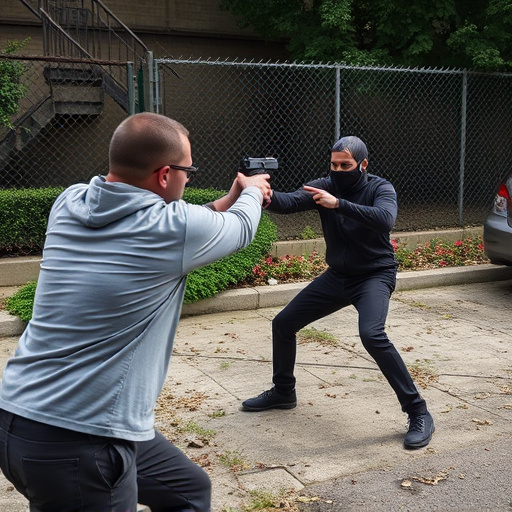Exposure to pepper spray requires immediate action. Remove contaminated clothing and rinse with water for 15 minutes. Move to fresh air, avoid strenuous activity, and apply cold compresses. For eyes, flush thoroughly with water. Seek medical attention for severe cases or persistent symptoms, as complications may arise. Research local laws regarding pepper spray possession before use.
“Discover the power of civilian-grade pepper defense spray and its impact on personal safety. This comprehensive guide explores the science behind this potent self-defense tool, from understanding its composition to mastering immediate response strategies after exposure. Learn effective medical treatment methods for irritation and long-term care techniques. Additionally, we delve into legal considerations, empowering victims with knowledge of their rights following pepper spray incidents. Equip yourself with vital insights on how to treat pepper spray exposure effectively.”
- Understanding Pepper Spray Composition and Effects
- Immediate Steps After Exposure: What to Do
- Medical Treatment for Pepper Spray Irritation
- Long-term Care and Recovery Strategies
- Legal Considerations and Rights of Pepper Spray Victims
Understanding Pepper Spray Composition and Effects
Pepper spray, a common self-defense tool, is a powerful substance designed to incapacitate an attacker temporarily. Its composition typically includes capsaicin, the active ingredient found in chili peppers, along with various other agents like glycerin and water for delivery. When sprayed, capsaicin irritates the eyes, nose, and respiratory system, causing temporary blindness, coughing, and difficulty breathing. Understanding these components is crucial when knowing how to treat pepper spray exposure.
The effects of pepper spray can vary based on factors such as concentration, weather conditions, and individual sensitivity. Victims may experience stinging, burning sensations, tears, and congestion. To mitigate these symptoms, immediate action should be taken. This includes removing contaminated clothing, washing the affected areas with soap and water, and seeking fresh air. In severe cases, medical attention might be required to prevent potential long-term respiratory issues or other complications.
Immediate Steps After Exposure: What to Do
If you’ve been exposed to pepper spray, the initial steps are critical for mitigating its effects. The first thing to do is remove any contaminated clothing or accessories, rinsing thoroughly with water from head to toe. This helps wash away the spray residue as quickly as possible.
Seek fresh air immediately by moving to a well-ventilated area. If outdoors, try to find open space away from densely populated areas. Inhaling deeply and slowly can aid in clearing your airways, but avoid strenuous activity or coughing, as this can exacerbate irritation. Applying a cold compress to affected skin areas can help reduce burning sensations, while gently washing eyes with clean water for at least 15 minutes is essential to alleviate pain and potential damage.
Medical Treatment for Pepper Spray Irritation
Pepper spray irritation can cause discomfort and, in some cases, severe medical issues. If exposed, it’s crucial to seek immediate medical treatment. The first step is to flush the affected area thoroughly with water for at least 15 minutes to dilute and remove the pepper spray chemicals. This simple measure can significantly reduce irritation and prevent further damage.
After initial flushing, over-the-counter creams or antihistamines may provide relief from itching and redness. In more severe cases, especially if breathing is affected, emergency medical care is necessary. Medical professionals might administer oxygen, use eye irrigation to clean the eyes, or prescribe medications to manage pain and inflammation. It’s important to remember that how one person responds to pepper spray exposure can vary greatly, so consulting a healthcare provider for personalized advice is essential after any incident.
Long-term Care and Recovery Strategies
Pepper spray exposure can have long-lasting effects on victims, making it crucial to understand how to treat such incidents effectively. The first step in managing pepper spray exposure is to ensure the individual’s safety and move them to a well-ventilated area immediately. This prevents further inhalation of the irritant. After de-escalating the situation, the next course of action is to flush the eyes thoroughly with clean water for at least 15 minutes to dilute the pepper spray residue.
For skin exposure, it’s recommended to remove any contaminated clothing and wash the affected areas gently with soap and water. If breathing becomes difficult due to inhalation, victims should seek fresh air immediately. Long-term care involves addressing potential medical complications, such as respiratory issues or skin infections. Consulting healthcare professionals is essential for appropriate treatment and guidance on managing symptoms, including irritation, redness, and discomfort.
Legal Considerations and Rights of Pepper Spray Victims
Using civilian-grade pepper defense spray, while a powerful tool for personal safety, comes with legal considerations that everyone should understand. First and foremost, it’s crucial to know that laws regarding pepper spray vary greatly from state to state. Some jurisdictions have strict restrictions on who can possess and use pepper spray, while others have more lenient regulations. Before purchasing or using any form of pepper spray, research your local laws thoroughly.
If you or someone else is exposed to pepper spray, it’s important to know how to treat the situation properly. Seek medical attention immediately if breathing becomes difficult or vision is impaired. Wash affected areas with soap and water to remove any residual spray. In many cases, victims may have legal rights if they were exposed to pepper spray without consent or in an inappropriate manner. Understanding your rights is essential for ensuring you receive fair treatment and seeking justice if necessary.
Pepper spray exposure can be a frightening experience, but understanding its composition, effects, and proper response strategies is crucial for both immediate relief and long-term recovery. By knowing how to treat pepper spray exposure, victims can mitigate irritation, seek necessary medical care, and understand their legal rights. Remember, prompt action after exposure—including irrigation, rest, and seeking professional help—is essential to enhance comfort and ensure complete healing.
